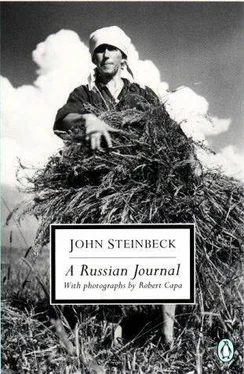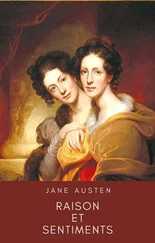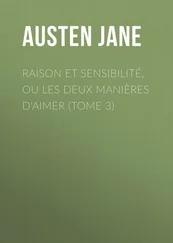Indeed, this trip to Russia brought back for both Steinbeck and Capa the specter of their own political agendas. The suspicion that The Grapes of Wrath, with its magnificent endorsement of "we" over "I," was communist propaganda lingered in the minds of some, certainly the FBI, who had maintained a file on Steinbeck since 1943. The truth was that Steinbeck had long despised the communist agenda: In Dubious Battle, a novel about striking workers in California, shows the communist organizers to be self-serving, willing to sacrifice the people's needs for the party's. When writing The Grapes of Wrath, with its emphasis on fair treatment for the working man, Steinbeck insisted that the lyrics for the "Battle Hymn of the Republic" be printed on the endpapers so that there would be no doubt about his patriotism. "The fascist crowd will try to sabotage this book because it is revolutionary," he wrote his publisher. "They will try to give it the communist angle. However, the Battle Hymn is American and intensely so… if both words and music are there the book is keyed into the American scene from the beginning."
In spite of his protestations, however, muted accusations that Steinbeck was "Red" lingered into the 1950s. In 1939, as The Grapes of Wrath was about to be published, he was convinced that the FBI was investigating him-in Monterey a local bookstore owner reported being questioned by Hoover's men and in Los Gatos his name had been turned into the local sheriff's office. FBI files on Steinbeck uncategorically deny that he was under investigation in the late 1930s, but they do detail a full investigation made of the writer in 1943 "to determine his suitability to hold a commission in the U.S. Army," a commission denied because of suspected communist sympathies. "Associates and friends," the FBI report notes, said that although he "exercised poor discretion during his early days of writing by associating with some elements of the Communist Party, he was not interested in advancing the cause of the Party but in gathering material for his writings on certain social conditions existing in the US at that time." In fact, evidence of communist leanings is decidedly thin: in 1936 and 1938, Steinbeck published two articles in the liberal Carmel magazine owned by Ella Winter and Lincoln Steffens, the Pacific Weekly; in 1936, he also lent his support to and possibly attended the Western Writers Conference, later labeled a "communist front" according to the committee on Un-American Activities; in 1938, he gave his 1936 San Francisco News accounts to the Simon Lubin Society, allegedly "a Communist front for California agrarian penetration"; in 1938, "the Committee to Aid Agricultural Workers was organized under Steinbeck's leadership"; in 1946, he was invited to a reception in New York for three visiting Soviet literary figures. That was it. John Steinbeck was-no communist, but he was very curious about communism's effect on the average man.
Nor was Robert Capa a communist, although his passport was confiscated in Paris in 1953 on allegations of communist sympathies; the evidence in his FBI file as thin as that in Steinbeck's. According to Whelan, Capa's dossier records only trivial associations with communism: "he had sold photographs to Regards during the Spanish Civia War; some of his pictures had appeared in a magazine published by Friends of the Abraham Lincoln Brigade; he had been either a member or an honorary member of the 'Radical anti-fascist' Photo League; he had gone to the Soviet Union with Steinbeck; the Daily Worker had reported his Herald Tribune Forum speech with approval. In 1950 it was added that he had spoken out against jailing the Hollywood Ten." Both men, according to Capa, "stated very clearly before and during our trip that we were not Communists or Communist-sympathizers." For their careful stance, however, they were reviled by the Soviet press after the book's publication, described as "gangsters" and "hyenas."
In the cold war climate of mutual distrust between the two countries, the most emblematic moment in A Russian Journal may well be Capa's first photographs:
Three huge double windows overlooked the street. As time went on, Capa posted himself in the windows more and more, photographing little incidents that happened under our windows. Across the street, on the second floor, there was a man who ran a kind of camera repair shop. He worked long hours on equipment. And we discovered late in the game that while we were photographing him, he was photographing us.
Indeed, KGB files indicate that Soviet authorities scrutinized movements of the pair throughout the fully orchestrated trip; instructions were precise:
Steinbeck is a man of conservative conviction and, in addition, he has recently become more right-wing oriented. That's why our approach to him should be especially cautious and we should avoid showing him something that can do us any harm.
The KGB report from Kiev was dutiful:
The task that the UOKS set for itself was to primarily show the visitors how the national economy and cultural valuables of the Ukrainian SSR were destroyed during the war and the great efforts of our people in restoration and reconstruction of the country.
The bulk of the report summarizes events and speculates on the attitude of Steinbeck and Capa toward what they saw:
I was with Capa when he took all of his pictures. He had an opportunity to take pictures depicting beggars, queues, German prisoners of war, and secret sites (i.e. the construction of the gas pipe-line). He did not take photos of this kind and approached picture-taking without reporter imprudence. Of the photos which cannot be considered favorably, I can point to only two: in the Museum of Ukranian Art, he took a picture of an emaciated woman-visitor, and on our way to the kolkhoz, he took a picture of a kolkhoz family wearing shabby clothes…
However, a close scrutiny of relations between Steinbeck and Capa also forces us to stipulate that Capa is more loyally and friendly disposed to us. Steinbeck in an underhand way gave Capa instructions to look for vulnerable, in his opinion, aspects of our life.
Steinbeck's frequent silences made officials uncomfortable. Capa's camera-he shot over four thousand photos-made them doubly uncomfortable.
A Russian Journal is an important book in the Steinbeck canon, much more so than has been acknowledged. Read for what it is, not for what it fails to do, Steinbeck's text sensitively captures a moment in Soviet history, as he intended. Steinbeck's carefully rendered vignettes, like Capa's photos, replicate his emotional response to a country and a people flattened by war, fed on propaganda, denied free speech, and convinced of the truth of their programmed responses. But they are people, always people.
And the trip to Russia also marks a crucial stage in John Steinbeck's gradual shift from his 1930s commitment to group man to his subsequent concern with individual consciousness. In Russia, the group had subsumed individual creativity, thought, and action.
“Wherever we went, the questions asked us had a certain likeness, and we gradually discovered that the questions all grew from a single source. The intellectuals of the Ukraine based their questions, both political and literary, on articles they had read in Pravda… we knew the articles on which they were based almost by heart." Steinbeck's fictional perspective was, in fact, shifting from the detached scientific viewpoint to the highly personal and moral stance given clear voice in his works after A Russian Journal. Immediately after his return he started thinking about his "long slow piece of work," the novel that would become East of Eden in five years, the study of individual moral choice. Traveling in Russia, he'd seen what a repressive regime could accomplish. In 1949, he wrote to John O'Hara:
Читать дальше











